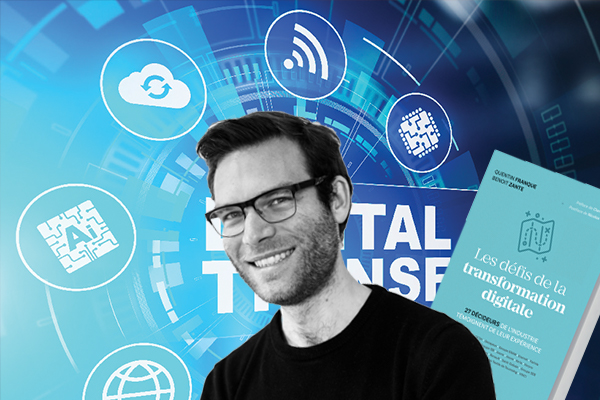
Earlier this year, OneChocolate interviewed Benoît Zante, an independent journalist who regularly works with media as Maddyness, Mind and Hub Institute. Co-author of the book entitled “Les défis de la transformation digitale – 27 décideurs de l’industrie témoignent de leur expérience”[1] (Dunod editions), for nearly 10 years, Benoît has been covering subjects tied to business digital transformation. We dive with him into this vast, constantly evolving topic, which has now become a main preoccupation for most economic players.
Why did you choose this subject and format (interviews) for your book?
The idea at the origin of this book was that most people feel confused when faced with digital transformation, despite the abundance of data and articles on the topic broadcasted in the media. There is a real need for actual testimonies from businesses that have already initiated or implemented their digital transformation, to answer the questions of other players who still have some.
One of the misconceptions Quentin Franque, co-author of the book, and myself wished to question is that digital transformation is not only for large groups and companies, but also for SMBs, which is rarely mentioned. We are convinced that, whatever their size, all businesses have something to bring to the others in terms of good practice and approach.
We met 50 decision-makers overall – CIOs, Digital, Marketing, and e-commerce Directors, CEOs, start-up founders – from all types of businesses, and we kept the most representative 27 interviews. We tried to vary the profiles of the interviewed, the type of company and sector they work in, thus multiplying perspectives. The good news is that, contrary to 3 or 4 years ago, returns on experience and testimonies are easier to come by, which means many recognize the importance of sharing their experience and being transparent about what works and what does not.
What is the main insight you gathered from the 27 interviews included in your book?
First, we see that digital transformation is critical in every industry, including the ones with the longest history. The second is that the main objective has nothing to do with technology, rather more with culture and adopting new practices, new uses, and a new way to view customers. No matter how much businesses invest in implementing new digital tools, these will not work in the long-term unless all the collaborators adopt them. Digital transformation is, first and foremost, a human challenge.
Among the 10 major challenges regarding digital transformation you list, which one is, in your eyes, the most significant? And why?
It is the one we called “supporting change”. While the importance of implementing tools and practices to move forward is well-understood by business decision-makers and teams that work on the field, there are mid-level collaborators who will not understand what the meaning of such a transformation or the reasons why their company is altering its work processes. These people must be supported, to reassure them and give these changes – which often instil fear and worry – meaning in their eyes. Business leaders and their teams have a role to play in this dynamic and in educating employees. Rather than “driving” change, they need to implement a real change in “culture”, a positive and agile state-of-mind, able to anticipate digital evolution, but also prepare for the next challenges, like the ecological transition.
Indeed, over the last six months of interviews, we saw the topic of energy transition rise among businesses, while it was not mentioned once during the first twelve months. We felt a change, the emergence of a trend in decision-makers. To implement a successful ecological transition, they first need to complete their digital transformation successfully, since it can prove difficult to make drastic changes on two fronts, especially for small businesses.

Which business case was the most notable?
Pierre Fabre, a family-held pharmaceutical group specialized in producing drugs and cosmetics. The head of the company, who invested himself in this transformation, was aware that change would be a challenge and that obstacles would inevitably arise. The company realized that, with the development of digital technology, final users were able to directly contact them through social networks, upsetting the company’s processes of using only pharmaceutical and prescription distributors to establish the return on experience. After a collective brainstorm and a SWOT session, the lab recognised the need to integrate final users in its communication and production cycle. Once again, this transformation pushed the boundaries of mere technology and motivated a change in approach and organization.
Do you think businesses are all at the same stage, late, or early when it comes to digital transformation?
The body of work is huge and not all businesses have realised the importance of current and future changes. A challenge in the short-term will be to initiate this movement in smaller companies. Among those we interviewed, some are aware that they are in danger of disappearing, should they be unsuccessful in changing their practices. Nevertheless, digital transformation is also a new source of opportunities and growth for sectors that have not yet entered this phase. Moreover, lateness in digital transformation is not necessarily a handicap, since businesses that just started the process can take stock in what has been done in other sectors and avoid repeating mistakes made by others.
Finally, what is the main advice you would give a business starting its digital transformation?
As in the Pierre Fabre case, the thinking process must be implemented collectively and take every collaborator’s ideas in consideration have a chance in succeeding to reorganise the company as a whole. You also need to leverage a number of aspects to avoid leaving anyone behind: this requires training, acculturation, role evolution, and test implementation. Some solutions are difficult to integrate in the business’ operations and tensions may arise. One of the main goals is to avoid human issues or collaborators leaving as far as possible, by undertaking actions to support change and help teams train and evolve in accordance with the new vision of the company.
Interview by Elodie Buch
[1] Literally: “The challenges of digital transformation – 27 business leaders in the industry share their experience”




